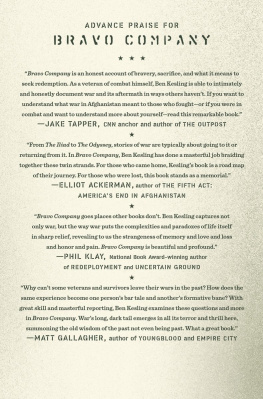Contents
Guide
Page List

ADDITIONAL ADVANCE PRAISE FOR
BRAVO COMPANY
Bravo Company is not your average book about the military or men at war. The book, brilliantly told through the lens of one company, perfectly captures the true cost of the decades-long war in Afghanistan. We meet young men who dreamed of life and adventure in the US Army, only to be broken physically and mentally by the toll of combat. For anyone who ever wanted to know about the cost of war, this is the book.
Ron Nixon, global investigations editor, Associated Press
The men of Bravo Company are captivating, raw, saltyand above all real. Ben Kesling knows of what he writes and does us a service to bring home their stories of war and the battles afterward.
Quil Lawrence, NPR correspondent and former bureau chief in Baghdad and Kabul
If you want to understand the fingerprints of American military culture and the terrible human consequences of bad policy decisions, this excellent book by Ben Kesling is the way.
Kori Schake, director of foreign and defense policy at the American Enterprise Institute
In Bravo Company, Ben Kesling searingly transports readers first into the lush valley at the heart of President Barack Obamas surge, where paratroopers saddled with an unsustainable mission rolled the dice with every step they took, and then into their lives back home as they wrestle with grievous injuries and the loss of friends in a war America ultimately lost.
Wesley Morgan, author of The Hardest Place: The American
Military Adrift in Afghanistans Pech Valley

Copyright 2022 Ben Kesling
Cover 2022 Abrams
Published in 2022 by Abrams Press, an imprint of ABRAMS. All rights reserved. No portion of this book may be reproduced, stored in a retrieval system, or transmitted in any form or by any means, mechanical, electronic, photocopying, recording, or otherwise, without written permission from the publisher.
Library of Congress Control Number: 2022933888
ISBN: 978-1-4197-5115-8
eISBN: 978-1-64700-140-7
Abrams books are available at special discounts when purchased in quantity for premiums and promotions as well as fundraising or educational use.
Special editions can also be created to specification. For details, contact specialsales@abramsbooks.com or the address below.
Abrams Press is a registered trademark of Harry N. Abrams, Inc.

| ABRAMS The Art of Books
195 Broadway, New York, NY 10007
abramsbooks.com |
For Kate, Gus, Lewis, and Alice. And Mara.
CONTENTS
PROLOGUE
LEAVING AFGHANISTAN BEHIND
NOVEMBER 2021
Its annoying that ten years after losing his legs in Afghanistan, Alex Jauregui still loses them.
JaureguiSergeant J to the men of Bravo Companywas swimming in a creek near his house a while back, and damned if one of his prosthetics didnt come off in the water. Those things go straight to the bottom, theyre all carbon fiber and metal. He should have known better, but he wasnt wearing a sleeve over his stump, so the prosthetic just slipped off when it got wet. Bloop! To the bottom.
Really the only time he wears a sleeve like hes supposed to is when hes doing something like skydiving. A leg could come off pretty easily up there in the air, and good luck finding it after that.
When Js not losing his legs, hes breaking them. He broke his foot the other day, snapped the carbon fiber. Hes got a passel of legs, so he can get by on spares if he needs to, but thats like driving a car around on one of those tiny spare tires, the donut. It just isnt right.
After he lost that leg in the creek and cracked a foot, he was down to spares. Its no good trying to get new ones from the local VA hospitalit can take weeks to get a new leg, sometimes more than a month. It takes even longer to fine-tune it and get it properly adjusted. Its not the local VAs fault, theres only so much demand for new legs out there where he lives in Woodland, California, away from a big city like LA.
So in times like that J just goes ahead and books a trip direct to Walter Reed, where the prosthetic clinic gets things done quickly. That place is the premier spot for veterans to get new limbs. Jeez, its like a factory showroom for fake legs. A couple of days there and he gets new legs, sleeves, liners. Everything.
When he first left Walter Reed, years ago, he had five sets of legs: primaries and spares and swimming legs and some fancy blades for running. But running hurts his back like hell, so the blades didnt get a lot of use.
Some adjustments he can do himself, little tweaks here and there, but for major adjustments he goes to the VA. Every time he gets a new pair of shoes, the tiny difference in soles will throw off his balance, and he has to get a tune-up so he doesnt trip all over the place.
And man, you can forget about dress shoesthose things call for a complete overhaul. Nowadays he rarely wears anything but his regular old work shoes with a suitwhen he has to wear a suit. Maybe its worth going through the tune-up hassle to wear dress shoes with a tuxedo, but how often does a guy need a tux?
As far as shoes go, he does miss the pleasure of caring about them. He was once a sneakerhead. Hed spring for the latest, greatest models. Jordans. But not now. A few years ago he dropped a couple hundred dollars on a new pair of basketball sneakers, real sharp. But he tripped and fell and that carbon-fiber foot of his ripped right through the shoe.
Fuuuuck, he said to himself. Im going to Ross.
And so he went to the discount clothing store for some beaters. He gets utilitarian shoes now. He buys them at Ross and wears them until the sole is gone.
* * *
Nowadays, being with his family gives J peace, yes, but a different kind of peace came for him with the bees. It started with seventy-five hives a few years ago, in 2015. When he first got his bees, he was hardly prepared. Hed jump if a bee landed on his hand. But hes got 1,200 hives now.
The apiary businessbeekeepingis a dream now that hes out of the Army.
The Army was his dream, a career as an infantryman his plan, but once his legs were taken off by a booby trap in Afghanistan he had to shift gears. For a fellow like Jauregui, the loss of his legs was just an unfortunate byproduct of his choice of profession, so he dealt with it.
Hes out there in California now, him and his wife and their three kids. Out where farmers have to rent truckloads of bees to pollinate their crops. Its mostly almond-tree orchards. Pollination is done the old-fashioned way, with bees flying flower to flower. People keep approaching him about starting a honey business, but hes focused on pollination.
For a pollination job, he moves a few hundred crates of beehives out to a farm, then comes and picks up those crates a few weeks later once the bees have done their thing and returned to their hives, sated and happy. After he got started in the business, a nonprofit gave him a forklift adapted for a man with carbon-fiber feet instead of flesh and blood. That lets him really make time when loading and unloading hives.
No joke, though, business is stressful out there in California. There are assholes who will sneak into the fields and steal your bees if youre not careful. Its not like you can brand a bees rump the way you can with cattle. But its no combat zoneits a dream life. And now he spends his days tending the pollination cycle, among the gnarled branches of almond trees that have been arranged into militarily precise rows. Its a good setup.












